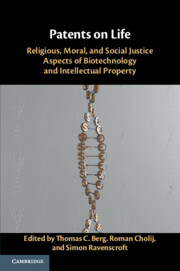 Patents on Life
Patents on Life from I - Life Patents, Law, and Morality
Published online by Cambridge University Press: 28 September 2019
This chapter advances the argument that religious and ethical reasoning have a role to play in policy debates about patent law, and also in some patent law cases. We begin at the most general level, by arguing that in democratic, pluralist societies, moral and religious argument have a legitimate contribution to make to public discourse tout court. We then make a case for the relevance of religious and moral deliberation for patent law in particular, given that inventions and new technologies that seek patent protection sometimes have significant repercussions for wider society, and patent protection is a way of encouraging and supporting their development. We also consider ways in which religion and ethics might be said to count as relevant evidence not only in patent policy debates, but also in patent proceedings. We address this against the background of the ‘politics of knowledge’ that has arisen in Europe and the United States, and include reference to the explicit immorality exclusion found in European patent legal systems. Given that the interpretation and application of the immorality exclusion has been controversial with lawyers, we finally propose an alternative, potentially more fruitful approach to the exclusion, treating it as a ‘policy lever’.
To save this book to your Kindle, first ensure no-reply@cambridge.org is added to your Approved Personal Document E-mail List under your Personal Document Settings on the Manage Your Content and Devices page of your Amazon account. Then enter the ‘name’ part of your Kindle email address below. Find out more about saving to your Kindle.
Note you can select to save to either the @free.kindle.com or @kindle.com variations. ‘@free.kindle.com’ emails are free but can only be saved to your device when it is connected to wi-fi. ‘@kindle.com’ emails can be delivered even when you are not connected to wi-fi, but note that service fees apply.
Find out more about the Kindle Personal Document Service.
To save content items to your account, please confirm that you agree to abide by our usage policies. If this is the first time you use this feature, you will be asked to authorise Cambridge Core to connect with your account. Find out more about saving content to Dropbox.
To save content items to your account, please confirm that you agree to abide by our usage policies. If this is the first time you use this feature, you will be asked to authorise Cambridge Core to connect with your account. Find out more about saving content to Google Drive.